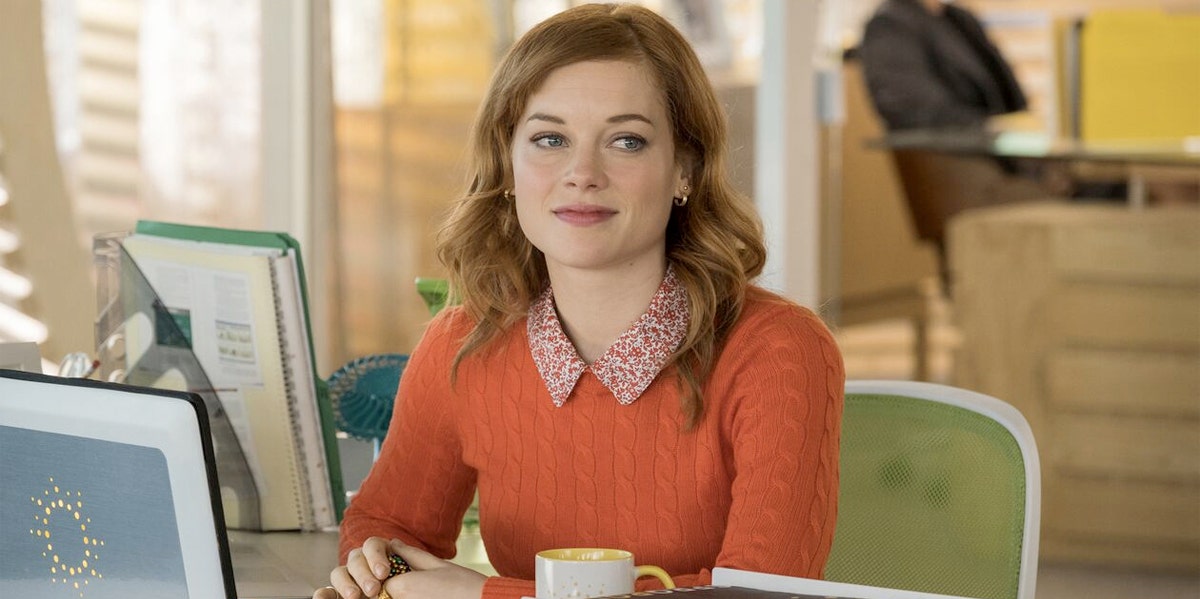'Zoey's Playlist' And The Problem With Shows About Women That Rely On Cheap Gimmicks
The show is symptomatic of a larger, cringe-y trend in women-centered TV shows.
 James Dittiger / NBC
James Dittiger / NBC Zoey’s Extraordinary Playlist, the second season of which returns at the end of March after its winter finale this past week, centers on the titular Zoey Clarke (Jane Levy) who wakes up one morning being able to hear the innermost thoughts of everyone around her — in song.
It’s a novel concept, but one that ultimately seems tacked on to what is otherwise an endearing show about coming to grips with a parent’s degenerative disease and — spoiler alert for the first season — ultimately, their death.
Zoey’s Playlist creator Austin Winsberg, whose own father died of the same disease (progressive supranuclear palsy) as Zoey’s father, Mitch (Peter Gallagher) does, has spoken about how the show allowed him to process his grief and, in that way, it’s commendable.
But using an able-bodied actor in the role of a character who has lost his speech and motor functions is a form of crip-face that is a poor justification to make the show a musical. Add to that the fact that many of the actors cannot sing (Lauren Graham, who has bafflingly performed musical theatre on Broadway, comes to mind), and I find myself skipping through many of the renditions which, at times, can be cringeworthy.
Zoey’s Playlist is symptomatic of a larger trend in women-centered shows that employ gimmicks that are wholly unrelated to the plot to draw viewers in.
Never Have I Ever is a similarly sweet show about a young girl dealing with the death of her father, growing up in an immigrant family, and just general teen angst. It is inexplicably narrated by tennis player John McEnroe, who also makes a cameo in the tenth and final episode of the first season, seemingly just because he could. Another problematic aspect that it shares with Zoey’s Playlist is the use of crip-face, with protagonist Devi (Maitreyi Ramakrishnan) becoming temporarily and literally paralyzed with grief. Both are needless inclusions that take away from an otherwise good show.
Netflix’s short-lived Soundtrack also got the pop-song treatment but, even more bafflingly, featured the actors lip-synching which I think soured viewers to a show that is actually better than it has any right to be.
Meanwhile, the 2019 Kat Dennings vehicle Dollface, about a woman who just got out of a long-term relationship only to realize she neglected all her friendships while in it, features an animated cat as a figment of Dennings’ character’s imagination.
Even the critically-acclaimed Insecure and last year’s anthology show Love Life include dispensable, inconsequential narrators (Issa Rae’s mirror self and a random British voiceover in the vein of The Bold Type, respectively).
These shows portray what it means to be a woman today, to varying degrees of success. It’s telling that because of the subject matter and the similar audience they are courting (ie. women), the creators or, perhaps, the marketing departments of the networks and streaming services they air on, feel they have to unnecessarily embellish these perfectly lovely stories in order to stand out in the marketplace.
There are high-concept shows about women that do this well, like Crazy Ex-Girlfriend, Jane the Virgin, Dickinson, and WandaVision, but this is because the gimmick feels baked in and true to the story.
Women-centered and -created shows have suffered a blow in these times, however, it’s important that creators and, indeed, audiences lean into realistic and sincere portrayals of our lives rather than throwing every idea out there and hoping that some of them stick.
Scarlett Harris is an Australian culture critic. You can read her previously published work at her website, The Scarlett Woman, and follow her on Twitter @ScarlettEHarris.

